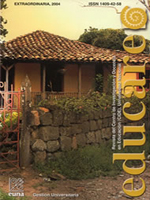Misión de la educación superior en una frontera de épocas
DOI:
https://doi.org/10.15359/ree.2004-Ext.1Abstract
Analysis of the main trends found in the historical scenario we live in: the Post Cold War period, globalization, disruption of Modernity, transition and limits of historical ages, and above all, modern knowledge as the builder of a new era. The main characteristics that define higher education are reviewed within this context; these traits are: expansion, diversification, its new relationship with the social context, transdiscipline, permanent education, radical internationalization and globalization, as well as quality and social adequacy as a basis in university activities. This is part of the redefinition of the main variables that characterize university activities.
References
Aguilar, M. (2001). La evaluación institucional de las universidades.
Tendencias y desafíos. Revista de Ciencias Sociales, Universidad de Costa Rica, números 92-93, 2001 (II y III), pp. 23-34.
Breton, G. y Lambert M. (2004). Higher education: social relevance and collective action. Higher Education Policy (The Quarterly Journal of the International Association of Universities ). Vol. 17, no. 1, March 2004, pp. 121-127.
Brovetto, J. y Rojas Mix, M. (1999). Universidad Iberoamericana. Globalización e Identidad. España: CEXECI.
Drucker, P. (1999). La sociedad poscapitalista, Buenos Aires: Editorial
Sudamericana.
Enders, J. y Weert E. (2004). Science, Training and Career: Changing Modes of Knowledge Production and Labour Markets. Higher Education Policy (The Quarterly Journal of the International Association of Universities). Vol. 17, no.2, June 2004, pp. 135-152.
Jensen, H. (2001). La unidad de la ciencia y la relevancia de la investigación. Revista de Ciencias Sociales, Universidad de Costa Rica, números 92-93, 2001 (II y 111), pp. 61-68.
La Nación (1999), San José, Costa Rica, 7 de febrero de 1999.
Mondolfo, R. (1966). Universidad: pasado y presente. Buenos Aires:
EUDEBA.
Neave, G. (2003). Perspectives on Higher Education in North America.
Higher Education Policy (The Quarterly Journal ofthe InternationalAssociation of Universities). Vol. 16, no. 1, March 2003, 1-7.
Paz, O. (1995). Itinerario. México: Fondo de Cultura Económica. Segunda
reimpresión.
Rojas Mix, M. (1999). La función intelectual de la Universidad: ¿una responsabilidad abandonada?, en Brovetto, J. y Rojas Mix, M. (editores). Universidad Iberoamericana. Globalización e Identidad. España: CEXECI.
Ruiz, A. (2001). El siglo XXI y el papel de la universidad. San José, Costa Rica: Editorial de la Universidad de Costa Rica.
Salom, R. (2001). Políticas de Investigación: una perspectiva desde las
ciencias sociales. Revista de Ciencias Sociales, Universidad de Costa Rica, números 92-93, 2001 (II y III), pp. 69-75.
Yarzábal, L. ( 1999). Plan de acción para la transformación de la Educación Superior, en Brovetto, J. y Rojas Mix, M. (editores). Universidad Iberoamericana. Globalización e Identidad. España: CEXECI.
Published
How to Cite
Issue
Section
License
1. In case the submitted paper is accepted for publication, the author(s) FREELY, COSTLESS, EXCLUSIVELY AND FOR AN INDEFINITE TERM transfer copyrights and patrimonial rights to Universidad Nacional (UNA, Costa Rica). For more details check the Originality Statement and Copyright Transfer Agreement
2. REUTILIZATION RIGHTS: UNA authorizes authors to use, for any purpose (among them selfarchiving or autoarchiving) and to publish in the Internet in any electronic site, the paper´'s final version, both approved and published (post print), as long as it is done with a non commercial purpose, does not generate derivates without previous consentment and recognizes both publisher's name and authorship.
3. The submission and possible publication of the paper in the Educare Electronic Journal is ruled by the Journal’s editorial policies, the institutional rules of Universidad Nacional and the laws of the Republic of Costa Rica. Additionally, any possible difference of opinion or future dispute shall be settled in accordance with the mechanisms of Alternative Dispute Resolution and the Costa Rican Jurisdiction.
4. In all cases, it is understood that the opinions issued are those of the authors and do not necessarily reflect the position and opinion of Educare, CIDE or Universidad Nacional, Costa Rica. It is also understood that, in the exercise of academic freedom, the authors have carried out a rogorous scientific-academic process of research, reflection and argumentation thar lays within the thematic scope of interest of the Journal.
5. The papers published by Educare Electronic Journal use a Creative Commons License:














 The articles published by Educare Electronic Journal can be shared with a Creative Commons License:
The articles published by Educare Electronic Journal can be shared with a Creative Commons License: 



